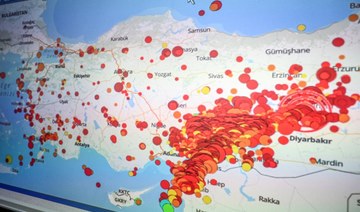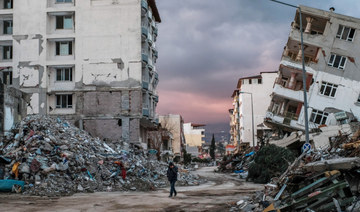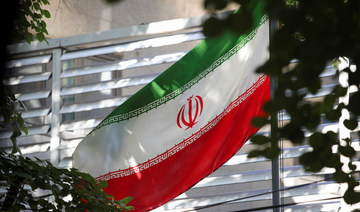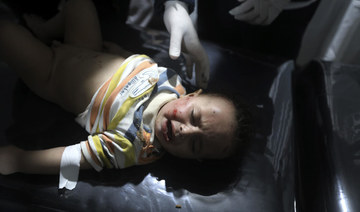IDLIB, Syria: Schools resumed classes in Syria’s rebel-held northwest Saturday after closing for nearly three weeks following an earthquake that devastated the region, local officials said, even as many schoolchildren suffer from shock.
Many schools were turned into temporary shelters following the 7.8 magnitude earthquake that struck Turkiye and neighboring parts of Syria on Feb. 6 and killed tens of thousands of people.
The quake left homeless hundreds of thousands of people in the area, many of whom had already been displaced by Syria’s 12-year-long war. Because of that conflict, the rebel-held area has also struggled to receive urgently needed humanitarian aid.
Many students were absent from their classes Saturday as their homes were damaged by the quake and their families now reside far away from the schools, said Abdulkafi Al-Hamdou a citizen journalist in the rebel-held region.
“Some students were worried about being inside the building and were on edge whenever they heard a sound such as a desk being moved,” Al-Hamdou said by telephone while visiting a school. “Many students are suffering from severe fear and anxiety. They are still in shock.”
An official with the education department in the region, Ziad Al-Omar, said 39 teachers and 421 students were killed by the earthquake. He added that some 250 schools suffered damage including 203 that were partially destroyed and 46 that had cracks in the walls though the structures were still standing.
Over the past days, displaced people were asked to leave schools and many of them moved into shelters to live in tents. But prices of tents have been shooting up amid shortages and sell for about $200 or four times above the pre-earthquake price. A solid tent with metal stands can cost up to $400, in a region where more than 90 percent of the population live in poverty and rely on aid for food and medicine.
Education officials in rebel-held Idlib said the last two hours on Saturday and Sunday will be used to train students on how to evacuate buildings during earthquakes.
One of those who lost a home in the quake is Ayesha, a resident of the town of Atareb in rural Aleppo who had to evacuate her home to live in a tent. She told The Associated Press that the temporary shelter offered to her extended family of 13 people had to be evacuated because organizers said schools are about to resume and the courtyard where tents had been set up had to be vacated.
“They gave us a tent in a school. Then they said the students have to return and they started evacuating us,” she said, giving only her first name like most women in the conservative area.
Having a big family, Ayesha rented a small house on the edge of Atareb but four days after they moved there, a new 6.4-magnitude earthquake struck on Monday. “The house, thankfully didn’t collapse, but the walls have cracks,” she said. “The ceiling remained in place.”
Since then, the family has set up a tent in the street out of fear of more aftershocks.
According to the opposition’s Syrian Civil Defense, also known as White Helmets, the earthquake killed 2,274 people and injured more about 12,400 in the rebel-held region. The quake also destroyed 550 buildings and heavily damaged at least 1,570 others, according to the White Helmets.
The total death toll of the earthquake is estimated to surpass 47,000 people in Turkiye and Syria — with the vast majority of deaths in Turkiye.
Schools reopen as Syrians live with quake’s devastation
https://arab.news/47d8m
Schools reopen as Syrians live with quake’s devastation
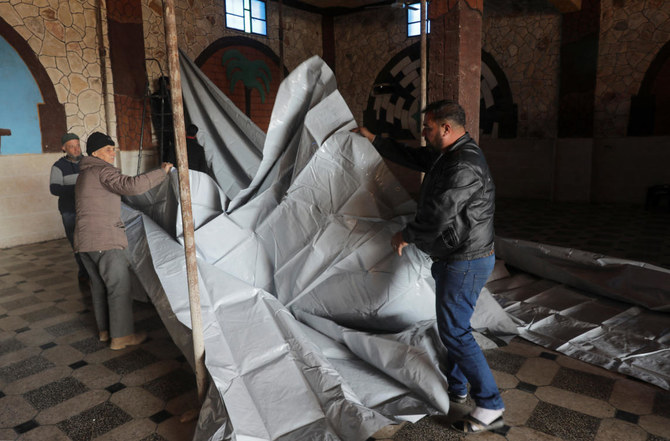
- Many schools were turned into temporary shelters following the 7.8 magnitude earthquake that struck Turkiye and neighboring parts of Syria on Feb. 6
- Many students were absent from their classes Saturday as their homes were damaged by the quake
New UK sanctions target Iranian drone industry
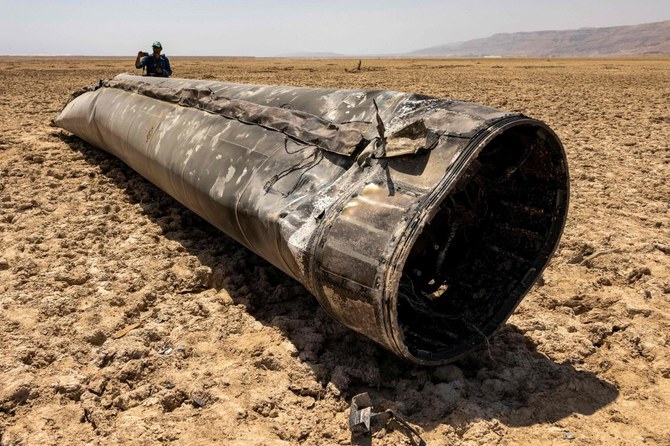
- The measures, taken in co-ordination with the US and Canada, target four businesses and two directors at a network of drone companies with the aim of limiting Iran’s ability to launch drones
LONDON: Britain on Thursday announced new sanctions targeting Iran’s military drone industry, in response to Iran’s drone and missile attack on Israel earlier this month.
The measures, taken in co-ordination with the US and Canada, target four businesses and two directors at a network of drone companies with the aim of limiting Iran’s ability to launch drones.
“The Iranian regime’s dangerous attack on Israel risked thousands of civilian casualties and wider escalation in the region,” British Foreign Secretary David Cameron said in a statement.
“Today the UK and our partners have sent a clear message – we will hold those responsible for Iran’s destabilising behavior to account.”
Britain also said it would introduce new bans on the export of drone and missile components to Iran, seeking to limit its military capabilities.
Last week, Britain imposed sanctions on Iranian military figures and organizations, in another coordinated move with the United States, following Iran’s action against Israel.
Iran launched drones and fired missiles at Israel on April 13 as a retaliatory strike for the attack on its embassy compound in Damascus two weeks prior, raising the risk of further escalation in conflict in the Middle East.
Egypt, Dutch leaders discuss Gaza ceasefire efforts

- Rafah assault ‘will have catastrophic consequences on regional peace and security,’ El-Sisi warns
- Egypt’s president and the Dutch prime minister agreed on the urgency of working toward reaching a ceasefire
CAIRO: Egypt’s President Abdel Fattah El-Sisi has discussed efforts to reach a ceasefire in Gaza with Mark Rutte, prime minister of the Netherlands.
During a phone call from Rutte on Thursday, the Egyptian leader warned that any Israeli assault on Rafah will have “catastrophic consequences” for the humanitarian situation in the enclave.
The leaders discussed bilateral relations, and ways to enhance cooperation across various political and economic levels consistent with the current momentum in Egyptian-European relations.
Ahmed Fahmy, presidential spokesman, said the call also focused on the situation in Gaza, and Egypt’s efforts to restore regional stability by reaching a ceasefire and providing access to humanitarian aid.
El-Sisi reiterated the crucial importance of ending the war, warning against any military operations in the Palestinian city of Rafah, which will have catastrophic consequences on the humanitarian situation in the strip and on regional peace and security.
The Egyptian leader underscored the need for the international community to assume its responsibilities to implement the relevant UN resolutions.
Egypt’s president and the Dutch prime minister agreed on the urgency of working toward reaching a ceasefire, and ensuring the flow of adequate humanitarian aid to all areas of the Gaza Strip in order to protect it from a humanitarian catastrophe.
They also emphasized the need to move toward implementing the two-state solution, which would restore regional stability, and establish security and peace in the region.
In March, El-Sisi received Rutte to discuss bilateral relations, regional developments, and Egypt’s efforts to reach a ceasefire and offer humanitarian assistance in Gaza.
Lebanon postpones local elections again as violence rocks south

- Lebanon is supposed to hold municipal elections every six years
- Parliament approved “extending the existing municipal and elective councils’ mandate until a date no later than May 31, 2025,” despite objections from lawmakers opposed to Hezbollah
BEIRUT: Lebanon’s parliament on Thursday delayed municipal elections for a third time in two years, state media reported, as militants in the country’s south exchanged near-daily fire with Israel for over six months.
The powerful Iran-backed Hezbollah group has been trading fire with Israeli forces across the border since the day after its Palestinian ally Hamas carried out a deadly attack on Israel on October 7, triggering the ongoing war in the Gaza Strip.
Lebanon is supposed to hold municipal elections every six years, but cash-strapped authorities last held a local ballot in 2016.
Parliament approved “extending the existing municipal and elective councils’ mandate until a date no later than May 31, 2025,” despite objections from lawmakers opposed to Hezbollah, said the official National News Agency.
The bill cited “complex security, military and political circumstances following the Israeli aggression on Lebanon” and especially its south, near the border, as reasons for the delay.
Lawmakers did not set a new date for the elections, initially scheduled for 2022.
Local councils help provide basic services to residents, but their role has declined as state coffers ran dry after Lebanon’s economy collapsed in late 2019.
Parliament Speaker Nabih Berri had previously said southern Lebanon could not be excluded from any upcoming ballot, after the Christian Lebanese Forces, the main party opposing Hezbollah, insisted on holding the polls on time.
More than 92,000 people have been displaced from their homes in Lebanon due to the violence, as have tens of thousands of residents of Israeli communities across the border.
Since violence began along the Israeli border on October 8, at least 380 people have been killed in Lebanon, including 72 civilians, according to an AFP tally.
Israel says 11 soldiers and eight civilians have been killed on its side of the border.
In April 2023, the Lebanese parliament had already postponed municipal elections as the deputy speaker warned holding them was “almost impossible” for the cash-strapped country after years of economic meltdown.
Lebanon has faced the prolonged financial crisis and months of border clashes essentially leaderless, without a president and headed by a caretaker government with limited powers amid deadlock between entrenched political barons.
Palestinian officials say Israeli forces kill teen in West Bank
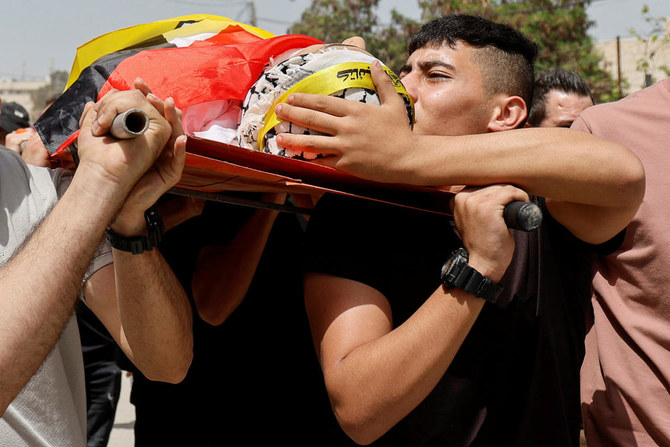
- Israeli police said “hits were identified” when forces responded to stone-throwing with gunfire
- The Palestinian health ministry said Khaled Raed Arouq was shot in the chest and “martyred by the occupation’s live bullets“
RAMALLAH, Palestinian Territories: Palestinian officials said Israeli forces killed a 16-year-old boy during a raid in the West Bank city of Ramallah early on Thursday.
Israeli police said “hits were identified” when forces responded to stone-throwing with gunfire but did not directly address the allegation.
The Palestinian health ministry said Khaled Raed Arouq was shot in the chest and “martyred by the occupation’s live bullets.”
Palestinian official news agency Wafa said Arouq died after being “shot by Israeli gunfire” early on Thursday morning.
Israeli forces carry out regular raids on towns and cities in the occupied West Bank and violence has soared in the Palestinian territory since the war in Gaza broke out on October 7.
Wafa said Israeli military vehicles stormed the city and “confrontations broke out between citizens and the occupation forces, who fired live bullets and stun grenades.”
It said Israeli forces were stationed in several neighborhoods and raided a house in Al-Bireh to the northeast.
Israeli police said: “Terrorists threw stones at the forces operating in the area, the forces responded with gunfire, and hits were identified.”
The police said they made several arrests and that Israeli forces did not suffer any casualties.
The army did not immediately respond to AFP’s request for comment.
Later on, Thursday, mourners carried Arouq’s body wrapped in the flag of Fatah, the political party of Palestinian president Mahmud Abbas, in his hometown of Jenin where he was buried.
“He was hit by a bullet in his back, which exited through his chest...They assassinated him in cold blood,” Majed Arqawi, cousin of Arouq, told AFP.
Wafa said Arouq’s father was an officer in the Palestinian military intelligence service.
Israel has occupied the West Bank since 1967 and at least 488 Palestinians have been killed by Israeli troops or settlers there since October 7, according to Palestinian officials.
At least 19 Israelis have been killed in attacks by Palestinians in the same period, according to official Israeli figures.
Hezbollah denies Israel claim it killed half of commanders in south
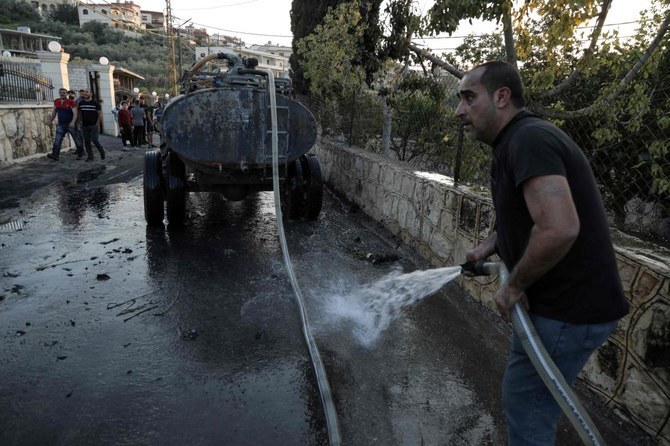
- The number of slain Hezbollah members who “hold a certain level of responsibility does not exceed the number of fingers on one hand“
- Gallant’s claim was “untrue and baseless”
BEIRUT: Hezbollah denied on Thursday an Israeli claim that it had killed half of the Iran-backed Lebanese group’s commanders in the south of the country, saying only a handful were slain.
The Lebanese group has been exchanging near-daily fire with the Israeli army since the day after its Palestinian ally Hamas carried out an unprecedented attack on Israel on October 7.
Israel’s Defense Minister Yoav Gallant said on Wednesday that “half of Hezbollah’s commanders in southern Lebanon have been eliminated” in the months of cross-border violence sparked by the Israel-Hamas war in Gaza.
“The other half are in hiding and abandoning the field to IDF (Israeli army) operations,” he added, without specifying how many.
A Hezbollah source who spoke on condition of anonymity rejected the claim.
The source told AFP that the number of slain Hezbollah members who “hold a certain level of responsibility does not exceed the number of fingers on one hand.”
The source said Gallant’s claim was “untrue and baseless” and designed to “raise the morale of the collapsed (Israeli) army.”
Israel has frequently claimed to have killed local Hezbollah commanders in targeted strikes, but the group has only confirmed a few were high-level members, referring to the rest as fighters in their statements.
Since October 8, the day after the Hamas attack on southern Israel, at least 380 people have been killed in Lebanon, including 252 Hezbollah fighters and dozens of civilians, according to an AFP tally.
Israel says 11 soldiers and eight civilians have been killed on its side of the border.
Tens of thousands of people have been displaced on both sides.
Both sides have stepped up attacks this week, with Hezbollah increasing rocket fire on military bases, while Gallant said in his latest remarks the army had carried out “offensive action” across southern Lebanon.
The Israeli military also said on Wednesday that it had struck 40 Hezbollah targets in Lebanon’s south.
Hezbollah leader Hassan Nasrallah has said his group had some 100,000 “trained” and “armed” fighters, but analysts say this number is likely inflated.



